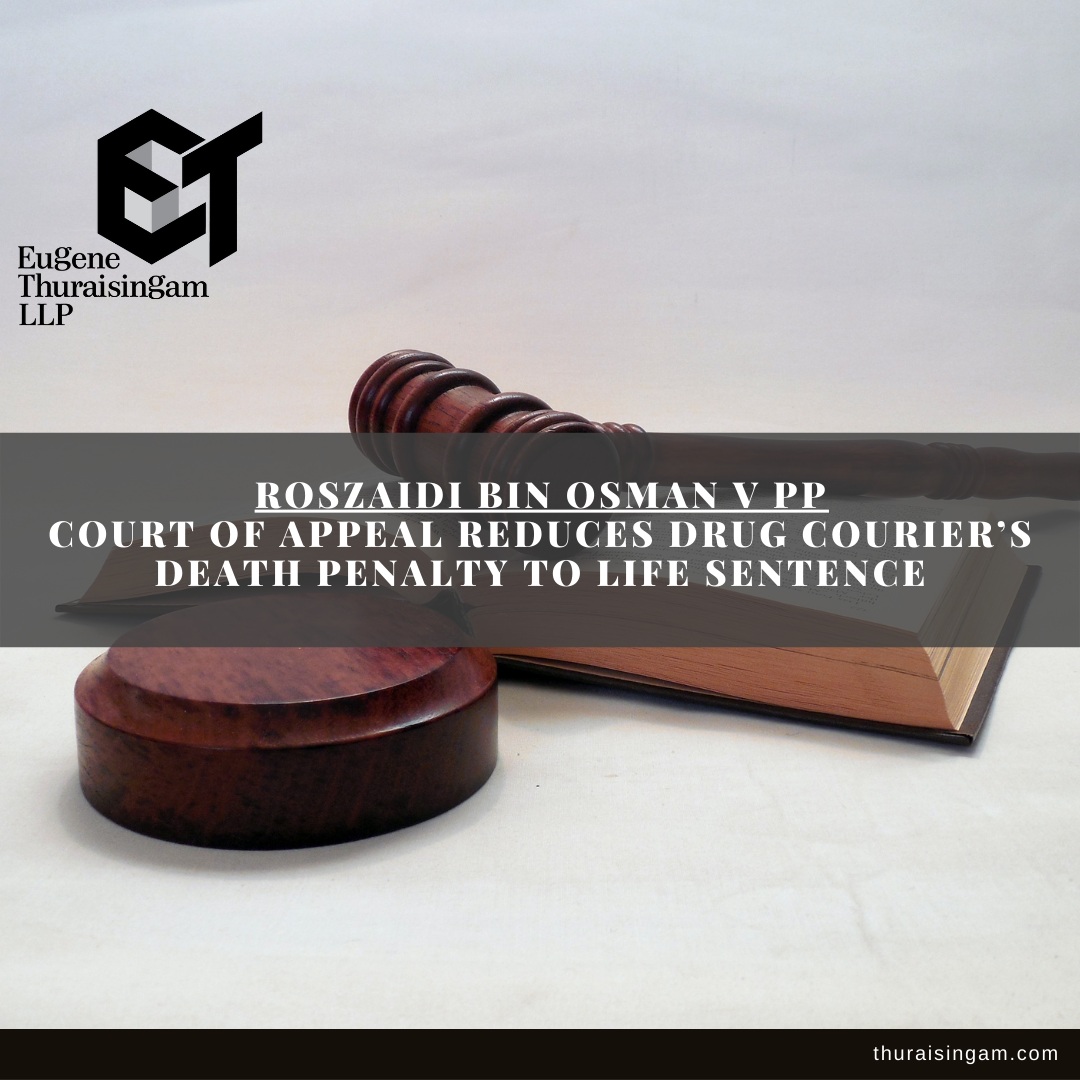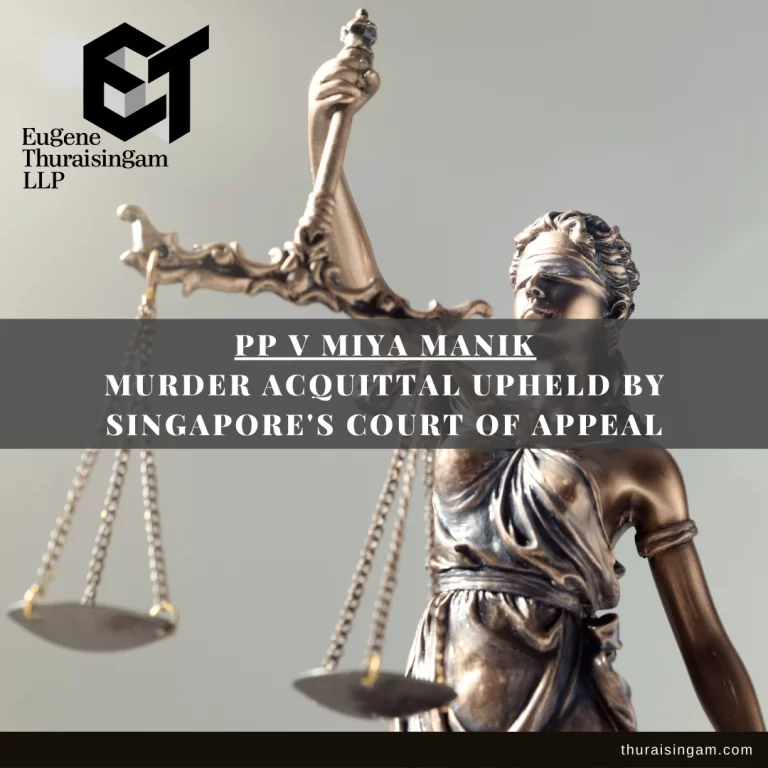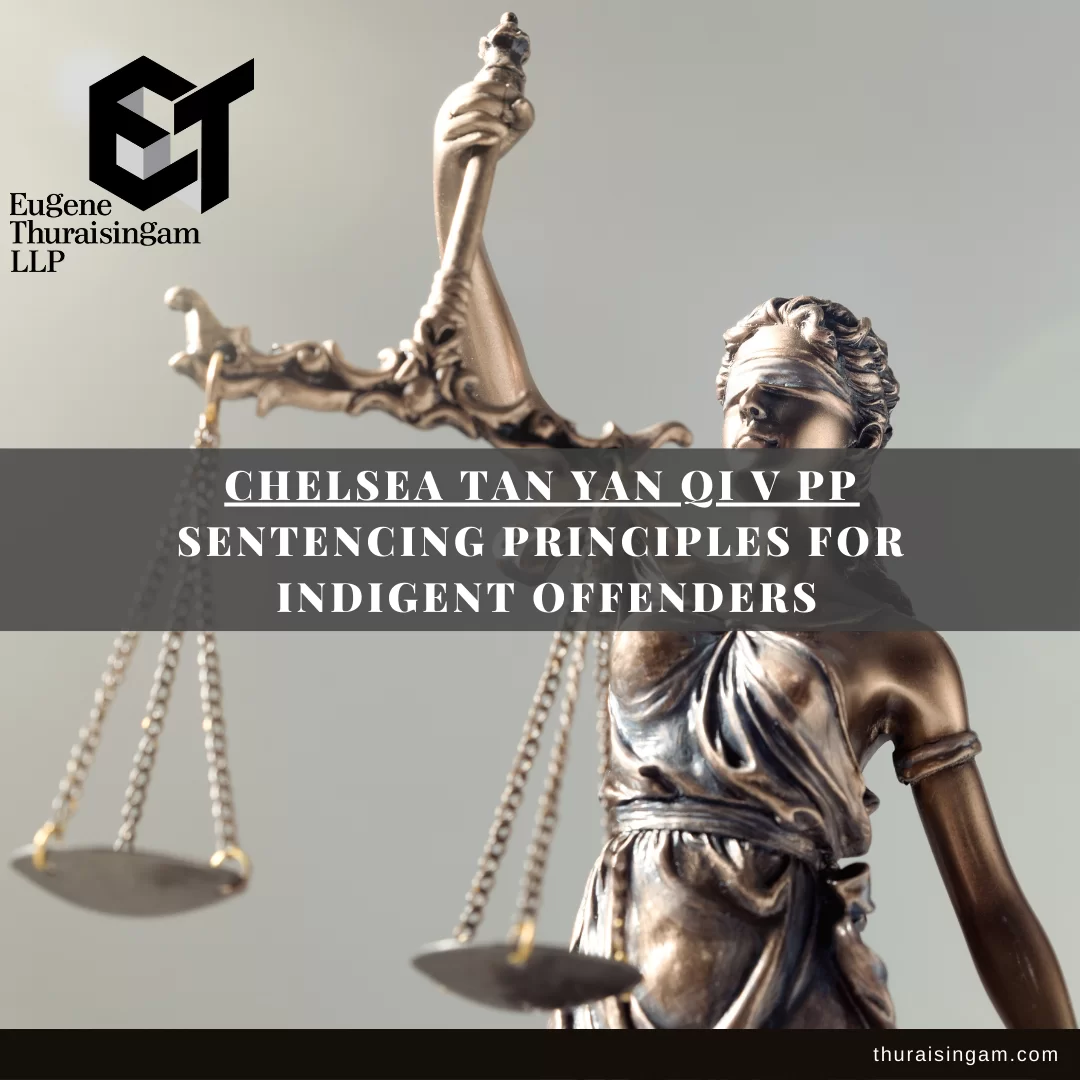The Law on Importation & Wilful Blindness – Accused Acquitted of Capital Charge
Public Prosecutor v Muhammad Shafiq Bin Shariff [2021] SGHC 150
1. Introduction
On 22 June 2021, the team at Eugene Thuraisingam LLP (comprising Eugene Thuraisingam, and Genghis Koh), as well as our former Partner Syazana Yahya, successfully secured an acquittal for Muhammad Shafiq Bin Shariff (“Shafiq”) of a capital drug trafficking charge, heard before Justice Ang Cheng Hock.
Shafiq was 25 years old at the time of the alleged offence in 2017 and was arrested en route to Singapore from Malaysia via the Woodlands Checkpoint. He was tried before Justice Ang Cheng Hock on one capital charge of importing five packets of 497.57g of crystalline substance containing not less than 334.67g of methamphetamine (also commonly known as “Ice”), an offence under section 7 of the Misuse of Drugs Act (Cap 185, 2008 Rev Ed) (the “MDA”) (“Capital Charge”).
2. What is the law on importation?
In Adili Chibuike Ejike v Public Prosecutor [2019] SGCA 38 (“Adili”) at [27], the following elements must be proved by the Prosecution to make out the offence of importation under section 7 of the MDA:
(a) the accused was in possession of the drugs;
(b) the accused had knowledge of the nature of the drugs; and
(c) the drugs were intentionally brought into Singapore without prior authorisation
Our client’s case was that he did not know that Ice was hidden in the Blue Box that he had brought into Singapore. As such, we argued that there must have been reasonable means of inquiry available to Shafiq as to whether he had possessed the drugs for the purposes of section 7 of the MDA. This is because, to prove possession, it must be shown that:
(a) the accused was in physical possession, control, or custody of the controlled drugs; and
(b) the accused knew that the thing that turns out to be a controlled drug was in fact in his possession, custody or control.
Hence, we submitted that Shafiq cannot be found to be in possession of drugs (even if they were within his physical custody) if they were planted on him without his knowledge, as clarified in Adili at [34].
3. Prosecution’s Alternative Case that Shafiq was wilfully blind
The Prosecution’s alternative case on wilful blindness related only to the element of possession, and not of knowledge of the nature of the drug (i.e. that while Shafiq did not actually know of the existence of the Drugs, he was wilfully blind to its existence)
The Court of Appeal in Adili laid down three requirements that must be satisfied and proved beyond a reasonable doubt by the Prosecution before a finding of wilful blindness could be made:
(a) the accused person must have had a clear, grounded and targeted suspicion of the fact to which he is said to have been wilfully blind.
(b) there must have been reasonable means of inquiry available to the accused person, which, if taken, would have led him to the discovery of the truth.
(c) the accused person must have deliberately refused to pursue the reasonable means of inquiry available so as to avoid such negative legal consequences as might arise in connection with his knowing that fact
In our client’s case, the Court found that Shafiq did not have a clear and targeted suspicion that the blue milk powder box contained the four packets of not less than 334.67g of methamphetamine, rather than milk powder, the ecstacy pills, or the small packet of ice. The Court reiterated that the mere fact that Husir is a known drug dealer does not ipso facto ground a suspicion that Shafiq had been handed a capital amount of methamphetamine.
This is because Shafiq was barely paid anything for the transaction and Husir had explicitly told Shafiq that he was only importing ecstacy pills and 1g of methamphetamine. Shafiq would only have had a suspicion that the blue milk powder box might contain the ecstacy pills and 1g of methamphetamine, but not a capital amount of methamphetamine.
As such, the Court found that the Prosecution has not shown that Shafiq was wilfully blind to the existence of the 333.7g of methamphetamine that was found in the four silver packets in the blue milk powder box.
4. Unique features of the case
The unique features of Shafiq’s case which led the Court to conclude that Shafiq has rebutted the section 18(1)(a) of MDA presumption on a balance of probabilities include:
(a) Shafiq consistently denied knowing that the blue milk powderbox contained methamphetamine in all of his investigative statements.
(b) Shafiq was not aware that Husir was selling methamphetamine, and, according to him, there were no large quantities of methamphetamine in Husir’s condominium unit.
(c) It is undisputed that Shafiq was only given the small packet of ice (0.97g of methamphetamine) for helping Husir to deliver the red plastic bag into Singapore.
(d) Shafiq was not involved in, and did not see, the packing of the blue milk powder box.
(e) Shafiq’s DNA was also not found on the blue milk powder box, even though the blue milk powder box’s exterior and interior surfaces were swabbed by the HSA for DNA.
(f) There is no objective evidence to show whether it is truly “impossible” to make large winnings from SCR888 in relation to what the Prosecution submitted as too large a sum for it to be winnings from SCR888 and/or sales from ecstacy dealings on Shafiq’s withdrawal of about S$22,000 after his first and second trips to Johor.
(g) Shafiq and Husir are evidently sufficiently well acquainted that Shafiq would allow Husir’s son, Rahilme, to sleep in Shafiq’s flat in Bukit Batok when Rahilme was in Singapore. Shafiq would not have had grounds to believe that Husir might sabotage Shafiq. Husir had explicitly told Shafiq that he would only be delivering ecstacy pills into Singapore, and Husir even showed Shafiq the 100 pills of ecstacy.
5. Conclusion
In light of the foregoing, Ang J found that the Capital charge has not been made out and did not convict Shafiq of the Capital charge.
However, as Shafiq had admitted to knowingly importing 0.97g of methamphetamine (which is a subset of the 334.67g of methamphetamine) Ang J amended the Capital charge under sections 138-139 of the Criminal Procedure Code (Cap 68,2012 Rev Ed) (“CPC”), wherein these provisions concern the situation where the court may convict the accused person on a charge that has not been framed. These provisions were analysed by the Court of Appeal in Public Prosecutor v Wee Teong Boo and other appeal and another matter [2020] 2 SLR 533.
[Read: Acquittal of Rape and Outrage of Modesty Charges]
As there are two other charges that have been stood down for the purposes of the capital trial, the Court will decide on the sentence at a later date, after the Prosecution informs the Court of its intentions on the remaining two stood down charges.






